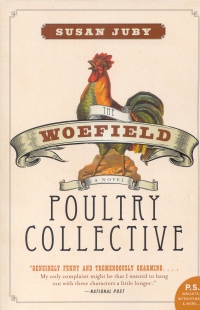| ________________
CM . . .
. Volume XIX Number 6 . . . . October 12, 2012
excerpt:
Prudence Burns is a New York City gal who is environmentally friendly: visiting the farmersí market, preferring organic foods, raising her own herbs in a hydroponic grow box, and recycling. With all of this experience, she feels quite capable of taking over the farm left to her when her uncle passes away. Thus, after only a few pages of the novel, Prudence gives up her city life and moves to Vancouver Island to become a farmer. This premise obviously opens the doors for mistakes, misunderstandings and a good deal of laughter as Prudence meets some of the local characters and does her best to fit in with her new neighbours. Along with the farm, she has inherited Earl, a hired man/ handyman who worked for years with her uncle. Unfortunately, his expertise lies more with playing the banjo than with actual farming, but Prudence insists he stay on the farm to continue lending a hand. Seth is a budding alcoholic who lives across the road from the farm. He dropped out of high school and now spends most of his time at the computer in his room writing blogs which no one reads. When his momís boyfriend decides to move in and will need Sethís room for his new business, Seth asks if he can have a new home, at least temporarily, on the Woefield farm. Sara is an 11-year-old dynamo whose main interest lies in chickens and who is a key member of the Junior Poultry Fancierís Club. Unfortunately, the residents of the subdivision to which her parents have moved are not nearly as fond of chickens as Sara. Thus, the family asks if the poultry can take up residence on the farm and, shortly after, Sara has reason to move there as well. Susan Juby brings all four characters together in a loose farming collective, and the humour continues from there. Prudence makes many mistakes as she embarks on her new career, but her energy and enthusiasm are endearing both to her new rural neighbours and to readers of the novel. In her effort to make mortgage payments and keep the bank happy, Prudence offers a variety of plans, some of which arise on the fly as she speaks to the rather serious loans manager. Prudence presumes that just a few weeks of work will enable her to join in the local farmersí market with her healthy, organic produce. When that seems less than likely, she decides that perhaps using the farm for a rehab centre, with Seth as one of her first patients, is a promising plan. The fact that Earl has become estranged from his famous bluegrass-playing brother leads Prudence to yet another plan for the farm: a reunion and bluegrass festival all in one. If only she can persuade Earl to play in public! The novel is funny and entertaining although, in parts, it borders on the ridiculous and becomes more slapstick than clever comedy. That said, Juby writes from the points of view of all four of the farmís inhabitants, and the tone clearly changes depending on the speaker. Readers will be entertained even when the Woefield adventures become almost impossible to imagine. Juby includes comedy of place, of character, and of events Ė a mix that is sure to please. This is Green Acres brought into 2012 or the series of Wingfield plays moved from Ontario to Vancouver Island. Despite the silliness, one canít help but enjoy and relate to the various characters, and Juby makes it clear that, while her main intent is humour, there is also the recurring theme of taking on challenges regardless of your misgivings, and making the most out of the situation in which you find yourself. Prudence is the most obvious example, as she accepts the responsibility of running the farm. However, Seth confronts his alcohol problem, Earl chooses to see his brother again and attempt the musical reunion, and Sara remains true to her goal of showing her chickens at the local poultry competition despite the obstacles which seem insurmountable. The Canadian Library Association has shortlisted this book for Book of the Year in the Young Adult section. It will have appeal for young adult readers who appreciate the humour of circumstance and character within the novel, but it will also be greatly enjoyed by adults who may be more likely to connect with The Woefield Poultry Collective as its primarily adult characters try to follow their crazy yet well-intended dreams. Highly Recommended. Ann Ketcheson is a retired secondary school teacher-librarian and teacher of English and French who lives in Ottawa, ON.
To comment on this
title or this review, send mail to cm@umanitoba.ca.
Copyright © the Manitoba Library Association. Reproduction for personal
use is permitted only if this copyright notice is maintained. Any
other reproduction is prohibited without permission.
NEXT REVIEW |
TABLE OF CONTENTS FOR THIS ISSUE
- October 12, 2012.
AUTHORS
| TITLES | MEDIA REVIEWS
| PROFILES
| BACK ISSUES
| SEARCH | CMARCHIVE
| HOME |
